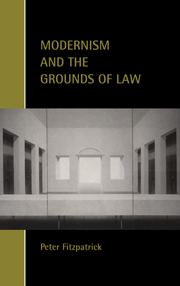4 - Nationalism
Published online by Cambridge University Press: 05 July 2014
Summary
We know what it is when you do not ask us, but we cannot very quickly explain or define it.
(Bagehot n.d.: 20–1)THE ABUNDANCE OF FAILURE
Given the extravagant prospectus outlined at the end of the last chapter, there should be something reassuringly resolute to begin this one; instead, it will plunge immediately into the irresolution of nation. That irresolution, however, provides constituent terms of nation's ‘being’ and it is those same terms which match those of law and effect a complementary relation between the two. If in the ‘age of codes and constitutions’ – the phrase is Foucault's (1981: 89) – law becomes illimitably self-generating, if it then allows of nothing before it, still it has to be particularly located so as to be determined and determining. It has, that is, to be of a contained place, yet not be contained by it. This impossible combination is accommodated by itself becoming constituent of the nation. The resulting irresolution ‘in’ nation is played out in terms of nation's being both particularly placed and universally uncontained. As with occidental law, it is in being set against certain alterities that nation assumes an ostensible coherence and its irresolution is putatively resolved – ‘resolved, that is to say buried, dissimulated, repressed’ (Derrida 1992a: 23).
Yet if nation, after a fashion, provides a place accommodating law, then law brings the same fashion to bear in filling the place of nation. There is a mutual constituting in and between nation and law. The new ‘nation-state’ – the state carrying a nationalism which forms along with modern legality – is in various idioms a ‘state of law’. Law is continually formative of nation, linking and mediating between its universal and particular dimensions, between its claim to inclusiveness and its claim to exclusiveness. In so doing, law effects and affirms an hierarchical and homogenizing authority, eliminating or subordinating all that would counter the nation-state in coming between it and its subject, the modern citizen - another player to be brought onto the stage.
- Type
- Chapter
- Information
- Modernism and the Grounds of Law , pp. 111 - 145Publisher: Cambridge University PressPrint publication year: 2001

